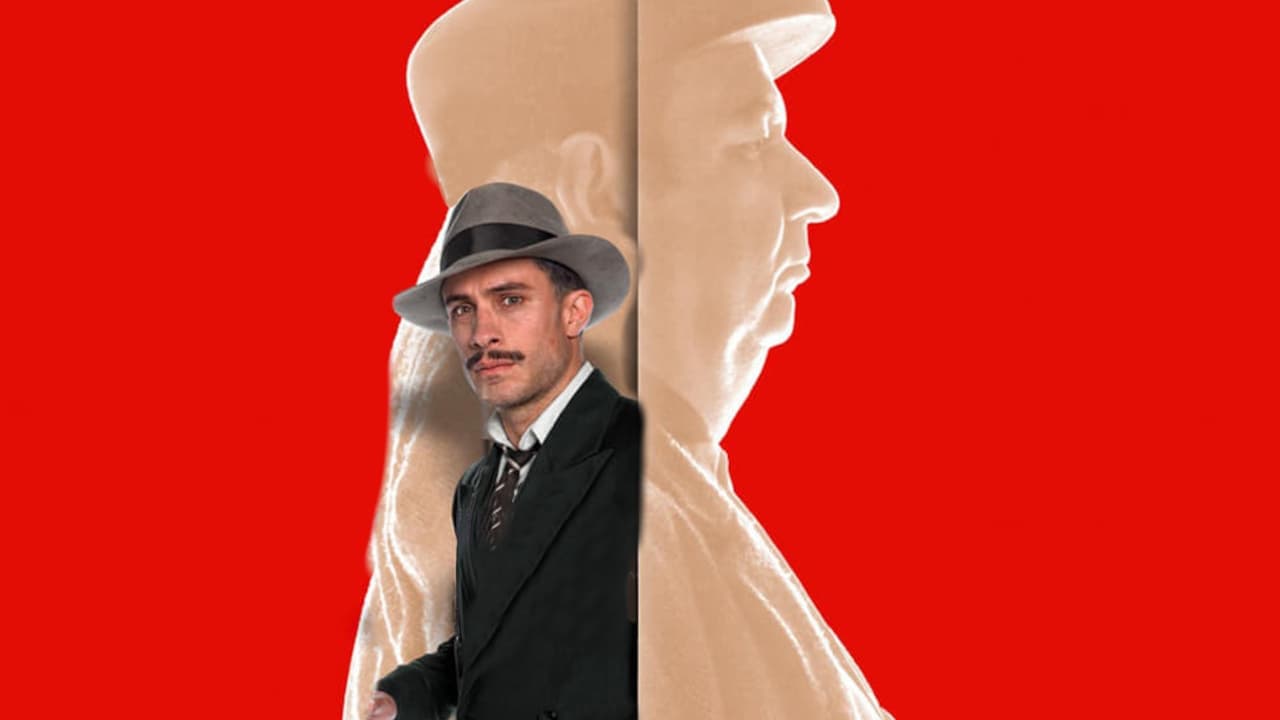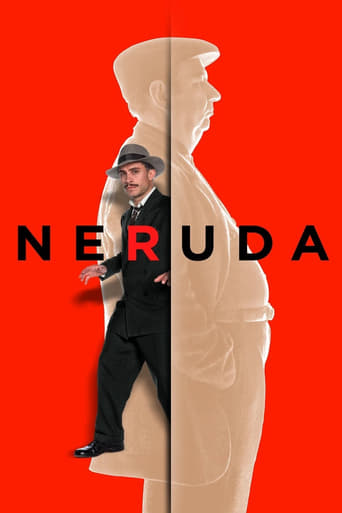Smartorhypo
Highly Overrated But Still Good
Twilightfa
Watch something else. There are very few redeeming qualities to this film.
Asad Almond
A clunky actioner with a handful of cool moments.
Brenda
The plot isn't so bad, but the pace of storytelling is too slow which makes people bored. Certain moments are so obvious and unnecessary for the main plot. I would've fast-forwarded those moments if it was an online streaming. The ending looks like implying a sequel, not sure if this movie will get one
masonfisk
Naruda is a segment of the great poet's life when he was accused of communism by the government & needed to flee. In pursuit of him, a loyal officer of the law tracks his prey, in what amounts to a person living vicariously through another's, we're meant to glean insight into the man's thoughts & why he's at odds w/the ruling class. Ultimately as presented we have 2 modes of film in conflict w/each other. Whereby the biopic is sorely lacking since we only focus on a glimpse of his life & the procedural, the hunter who tries to imprint his quarry's worldview onto himself to better acquire his target. Handsomely produced & the second film from Pablo Larrain during the same year (!) as Jackie, this uneven film does have some merit.
SnoopyStyle
In post war Chile, Communist poet Senator Pablo Neruda (Luis Gnecco) enrages the political establishment. He decides to go into hiding as Óscar Peluchonneau (Gael García Bernal) leads a large police dragnet to arrest him. Soon, anti-communist repression takes hold in the country and many are imprisoned.This has too much of an artistic flair. I get the connection with a poet protagonist. I would like to understand the political climate at the beginning. Neruda talks about strikes. It would be helpful to see more of the anti-union brutality. It would set the stage for his initial escape. Not everybody knows the history or even who Augusto Pinochet is. I like the Captain Ahab aspect of Peluchonneau. It would be good to have less artistic flair. I want less literary exposition and more intense thrills. I like the turn as the political roundups take its toll and the darker character descend. There is a more intense take on this story but I'm not completely opposed to this artistic rendering.
theta30
I think the movie is a parable of Chile's or Latin America's modern tragic history. Dictatorships of any sort ravaged the continent for some decades. Artists such as Neruda suffered under these regimes. Remember Chilean's Victor Jara executed on a stadium? I think Chileans viewers will find clues in the movie that other ones would miss.Oscar Pelochonneau represents a typical instrument of these dictatorships: the military/cop/bureaucrat/judge who executes the unjust sentences. Even if he reads Neruda's poetry, he does not understand it; he is under the weight of his mediocrity. Moreover, he despises the rebels-in a scene we see how he calls them scums; and this shows his ignorance.Neruda represents then the creator, the artist whose words transcend historical time-his words survive the temporary regimes and give hope to those who suffer. In this sense, in a surprising act, we see how Neruda's friends give away clues to where he might be - he can't be apprehended because his creation cannot be apprehended, so we might just well tell you where he is. Also, in this sense, even his follower and what he represents is an idea that the writers of age imagined already.Common in Latin America literature and cinema (eg Madeinusa, Jauja), we encounter a mysterious, lawless, remote and harsh territory. In these territories one uninitiated foreigner might experience transformation and sometimes redemption. Now, we have Oscar following Neruda in such a territory at the country border. We may expect that after his experience here, the typical Oscar will raise somewhere to be a better person. Perhaps due to the focus on the above themes and the pursuing story, there is a smaller emphasis on the actual poetry or on his socialist views. It's interesting to glimpse into the beginnings of socialist attempts in Chile. The movie raises other questions-say, how a bourgeois as Neruda is after all, is understanding the lower class - and he is confronted about this by a peasant. Other question: up to what point you risk your freedom to help him escape?
Horst in Translation (filmreviews@web.de)
"Neruda" is a Chilean Spanish-language film from 2016 directed by Pablo Larraín and written by Guillermo Calderón, not the first collaboration by this duo. It runs for 105 minutes roughly and focuses on the post-WWII years in writer Pablo Neruda's life. Do not be fooled by the title here: This is not a biopic and this is maybe also the film's biggest problem. Of course, you need to use an actor like Gael Garcia Bernal if you have him at your disposal, but he really took away from the film here in terms of quality and with this I am not talking about the performance, but about his character in general. I really would have liked this film to focus exclusively on Neruda, but many times you have a feeling that he just plays second fiddle to GGB's character here. The latter is a police officer in charge of finding Neruda and the longer the film goes, the more mysteriously it all becomes. Is he just a figment of Neruda's imagination? Is he a character from one of Neruda's works? Is he an actual police officer? Is it Neruda himself? There is no definite response to any of these questions. But the occasionally pretentious voice-over coming from Óscar (that's his name) as well as the fact that Bernal is credited first makes obvious that Neruda is just means to the story and his co-lead here, a tool basically, but not the man in charge, even if the police officer's actions are all consequences of Neruda's.I personally would have preferred this film to be entirely about Neruda or at least to keep it a more factual, more thrilling tale of one character ruthlessly chasing the other. More realism would have helped. instead questions arise like why does he not have any officers under him that help him. Why is he always chasing him like a lone wolf? Or why does he seem to die at the end and then magically reappears again. These may all be symbolisms or metaphors, but it's mostly over the top and the link to realistic events gets lost inevitably the longer the film goes. This is a shame as the subject of Neruda could have made for a really great film. From what we see in here, the character is very interesting, as a politician as well as writer. Now we have to wait probably another decade till we get a new Neruda film and maybe that one will be as weak as this one here too. I think the idea of Óscar having doubts about his own worth and how he needs to be an artist too to take down Neruda, not just a supporting player was a really nice one and the entire film and protagonist's inner conflict could have been about this all the time. Instead the script feels lost and lacking focus on more occasions than one. It also shows how little awards recognition Gnecco received for such a baity character that it is all about GGB, even if he didn't receive that much either. I think all the consideration for this film in foreign language categories (also at the Golden Globes) feels very exaggerated. It is Larraín's weaker 2016 film compared to the Oscar-nominated "Jackie" and also compared to "No". I have to give "Neruda" a thumbs-down and say the Academy got it right in not nominating Chile's submission this year, also not including it among the final nine. Not recommended and you can certainly say this is "Catch Me If You Can" gone wrong because it did not try to tell a memorable story, but be way too artistic for its own good.

